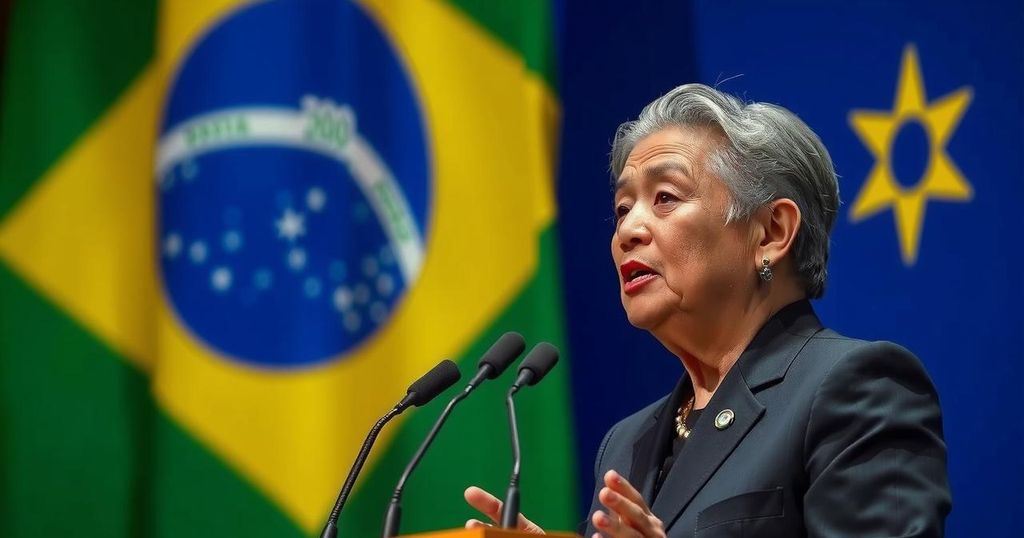Brazilian President Lula has launched a global alliance at the G20 Summit to combat poverty and hunger, citing political decisions as key obstacles. The initiative, signed by 81 countries, underscores climate change concerns amidst ongoing global conflicts. The discussions also point to the geopolitical tensions affecting the summit, especially with a notable absence from Russian leadership while the U.S. is shifting military support in Ukraine. The G20’s ability to resolve climate financing issues remains a pressing concern.
Brazilian President Luiz Inacio Lula da Silva has inaugurated the Group of Twenty (G20) Summit in Rio de Janeiro by introducing an international alliance focused on eradicating poverty and hunger. In his opening remarks, President Lula underscored that these pressing issues are largely a consequence of political decisions, emphasizing the urgent need for collective global action against climate change. He advocated for world leaders to address these intertwined challenges with diligence and commitment. The initiative, supported by 81 nations—including all but one of the G20 member states and two major unions—reflects a growing consensus on the need to prioritize humanitarian and environmental concerns. Argentina, under the leadership of far-right President Javier Milei, is the only G20 nation that refrained from endorsing the proposal. A source from Brazil’s Foreign Ministry indicated that some nations are considering revisions to the summit communique, particularly concerning discussions on climate and conflicts. As the summit unfolds amidst ongoing conflicts in the Middle East and Ukraine, it presents an opportunity for Brazil’s leftist leadership to champion critical issues such as hunger alleviation and climate action while proposing tax reforms aimed at wealthier individuals. Notably, discussions about the war in Ukraine are anticipated to occur informally, despite the topic not being on the official agenda. The absence of Russian President Vladimir Putin due to an international arrest warrant has also marked the summit, with Foreign Minister Sergey Lavrov representing Russia. U.S. President Joe Biden, whose participation comes at a pivotal moment following a significant policy shift regarding military support for Ukraine, is attending the summit as part of his concluding global diplomatic efforts. Concurrent with the G20 meeting, Biden’s recent affirmation of his climate initiatives amid concerns regarding the upcoming U.S. presidential elections signals a commitment to maintain progress in climate dialogues. Moreover, pressure mounts on G20 leaders to revive negotiations regarding climate financing for developing nations at the stalled COP29 conference in Azerbaijan. UN Secretary-General Antonio Guterres has appealed for robust leadership from G20 countries, which collectively account for 80% of global carbon emissions.
The G20 Summit, gathering the world’s major economies, addresses pressing global issues, such as poverty, hunger, and climate change. The backdrop of ongoing conflicts, including those in the Middle East and Ukraine, complicates discussions. The summit aims to facilitate initiatives, such as President Lula’s anti-poverty alliance, while managing differences among member nations. Contributions from leaders like President Biden and notable absences, such as President Putin, reflect the geopolitical tensions influencing G20 dynamics, particularly around topics like climate financing and military support. As climate negotiations remain stalled, the G20 has a critical role in reconvening efforts to secure necessary funds for developing countries and aggregating support for climate initiatives. The summit’s discussions are set against a significant political landscape, potentially impacting international collaboration in addressing climate change and humanitarian crises.
The G20 Summit, marked by President Lula’s launch of a global anti-poverty alliance, highlights the urgency of addressing poverty, hunger, and climate change amid global tensions. With participation from major economies and geopolitical absences, the summit is poised to navigate complex discussions that intertwine humanitarian priorities with pressing security challenges. As the world looks towards solutions, the unity, or lack thereof, among G20 members will significantly shape future global policies regarding climate action and international relations.
Original Source: www.aljazeera.com






